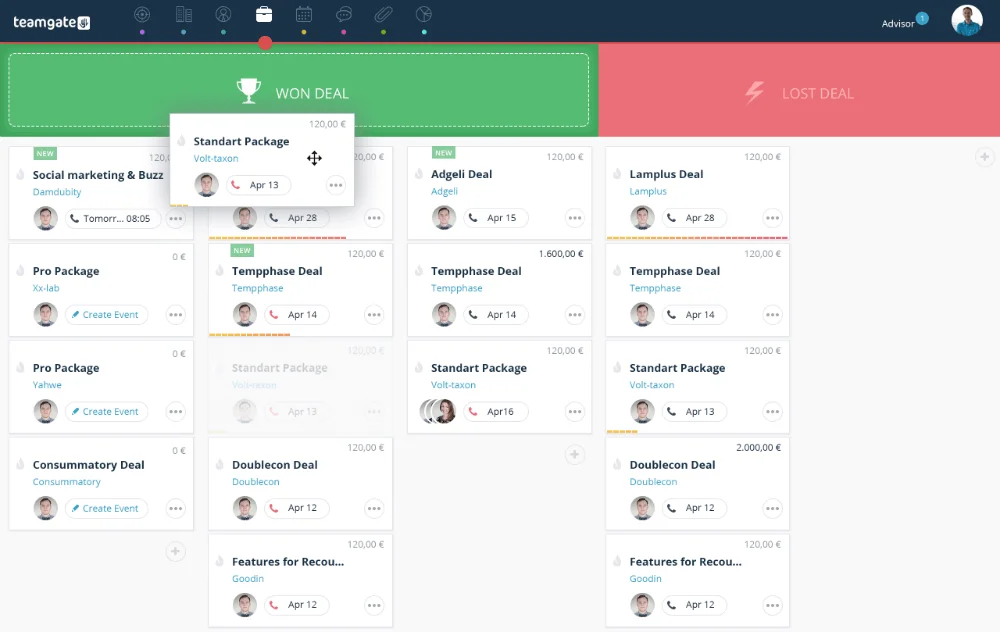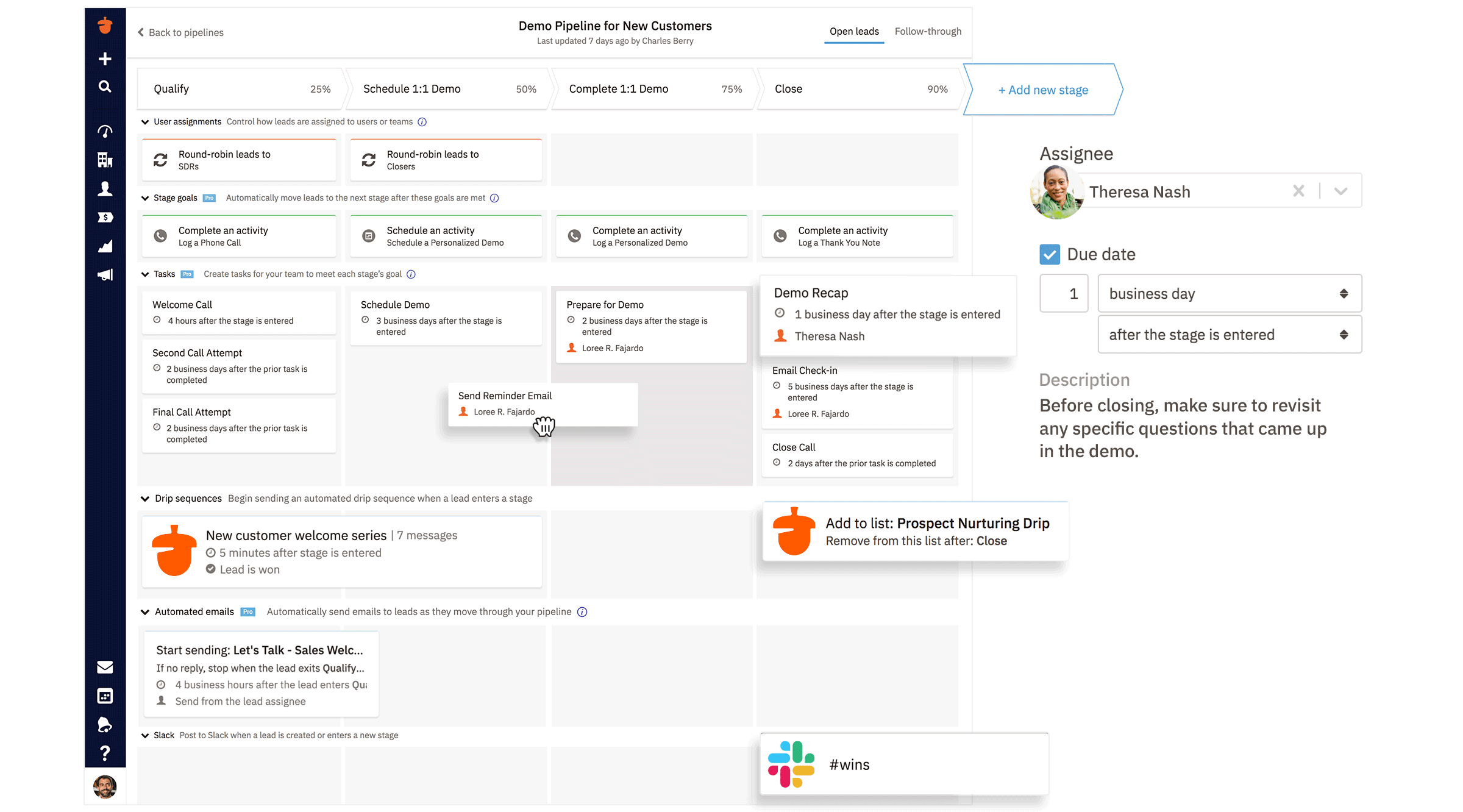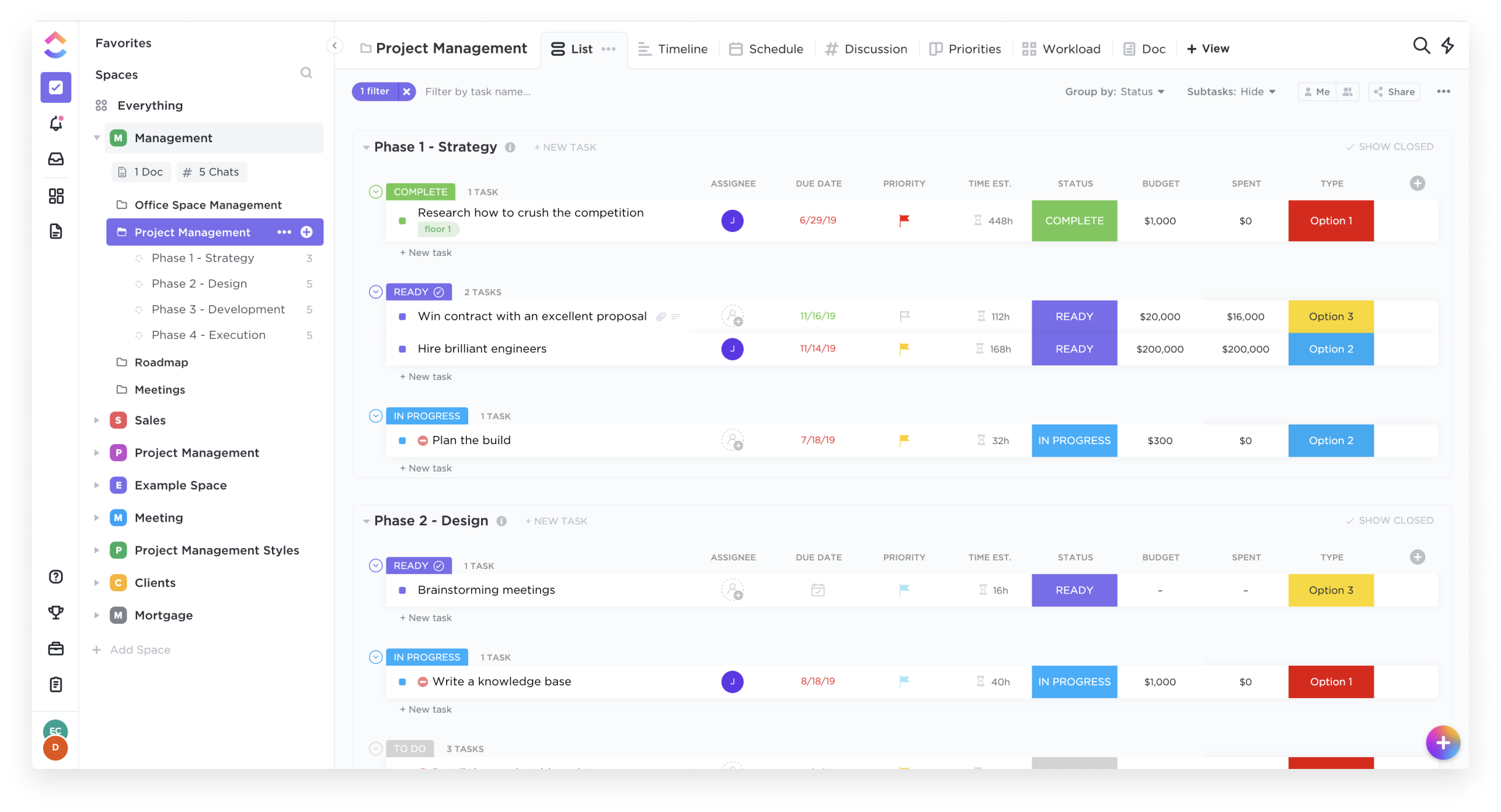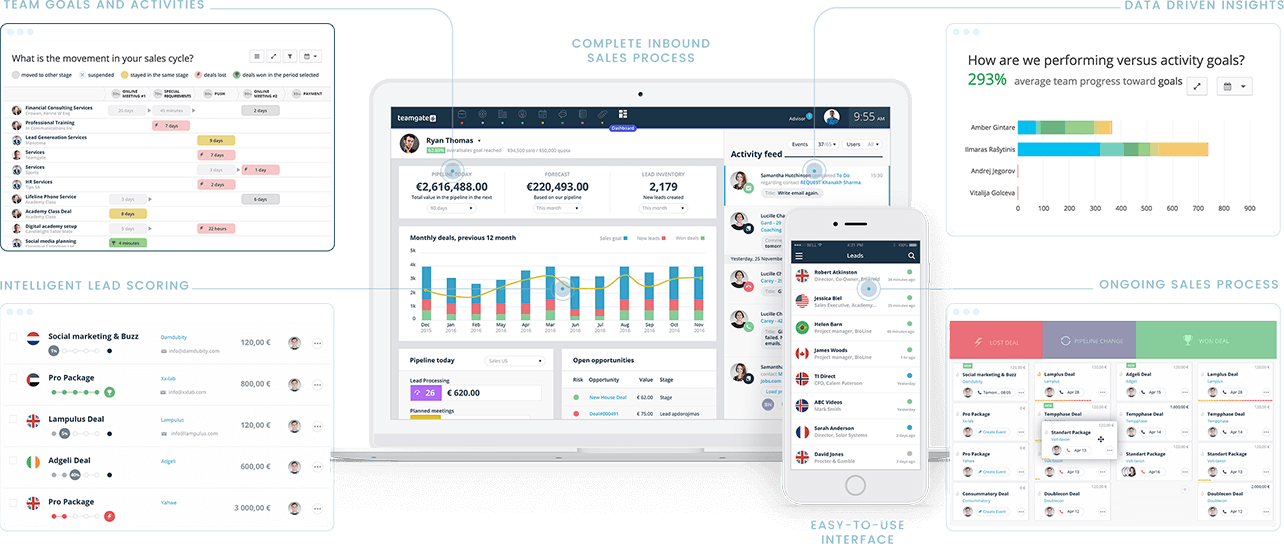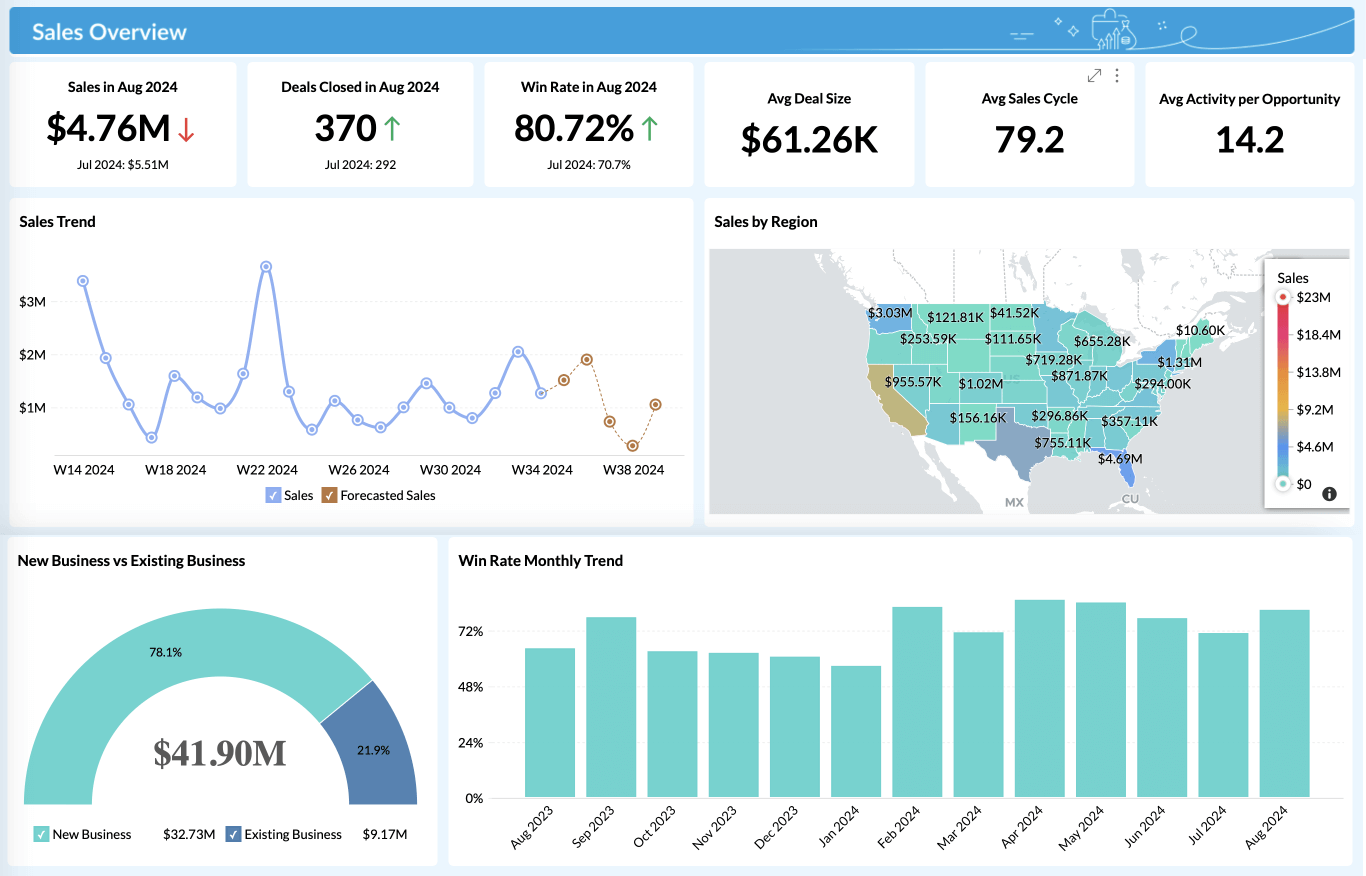In today’s competitive business landscape, selecting the right Customer Relationship Management (CRM) system is crucial for driving sales efficiency and growth. A Full-Cycle Sales CRM encompasses the entire sales process, from lead generation to customer retention, providing a comprehensive solution for managing sales activities. This article will delve into the top 9 features to look for when choosing a Full-Cycle Sales CRM, ensuring your business can optimize its sales processes, improve customer interactions, and drive revenue growth.
Understanding the core functionalities and benefits of a robust CRM can empower your sales team, streamline workflows, and enhance data-driven decision-making. With a myriad of CRM solutions available, identifying the features that align with your business needs is essential. This guide will help you navigate the essential components of a Full-Cycle Sales CRM, enabling you to make an informed decision that fosters long-term success.
Key Takeaways:
- Understanding Critical CRM Features: Learn about the essential components that make a CRM effective for full-cycle sales management.
- Optimizing Lead and Contact Management: Discover how robust lead and contact management features can enhance customer relationships and streamline sales processes.
- Enhancing Sales Efficiency with Automation: Understand the importance of sales automation in reducing manual tasks and increasing productivity.
- Leveraging Reporting and Analytics: Explore how real-time data and customizable reports can drive informed decision-making and improve sales strategies.
- Ensuring Scalability and Integration: Gain insights into the importance of customization, scalability, and integration capabilities in a CRM to support business growth and seamless operations.
Contents:
- Lead Management
- Contact Management
- Sales Pipeline Management
- Sales Automation
- Reporting and Analytics
- Integration Capabilities
- Customization and Scalability
- User Experience and Interface
- Customer Support and Training
- Conclusion
- FAQs: Full Cycle Sales CRM Top Features
Full-Cycle Sales CRM: Top 9 Features in 2024
Lead Management
Definition and Importance of Lead Management
Lead management is a critical feature in a Full-Cycle Sales CRM, serving as the foundation for successful sales operations. It involves capturing, tracking, and nurturing leads until they are ready to make a purchase. Effective lead management ensures that potential customers are systematically guided through the sales funnel, improving conversion rates and maximizing revenue opportunities.
Key Functionalities
Key functionalities of lead management include lead capture, lead scoring, and lead nurturing. Lead capture involves collecting information from various sources such as web forms, social media, and events, centralizing all potential customer data in one place. Lead scoring helps prioritize leads based on their likelihood to convert, allowing sales teams to focus their efforts on high-potential prospects. This scoring is often based on factors such as engagement level, demographic information, and previous interactions.
Benefits of Lead Management for Sales Teams
Lead nurturing is essential for building relationships with prospects over time, using targeted communication strategies like email marketing and personalized content. A CRM with robust lead nurturing capabilities can automate follow-up tasks, ensuring that leads receive timely and relevant information that moves them closer to a purchase decision. Incorporating these functionalities into your CRM can significantly enhance the efficiency and effectiveness of your sales team, ensuring that no potential opportunity is overlooked.
Contact Management
What is Contact Management?
Contact management is another vital feature of a Full-Cycle Sales CRM, providing a centralized repository for all customer information. It goes beyond merely storing contact details, encompassing a comprehensive view of customer interactions, preferences, and history. This holistic approach enables sales teams to build stronger relationships and deliver personalized experiences.
Essential Features of Contact Management
A robust contact management system allows you to maintain detailed records of every customer, including communication history, purchase behavior, and support tickets. This 360-degree view of each contact ensures that all team members have access to up-to-date information, facilitating seamless and informed interactions with customers. Additionally, contact management systems can segment customers based on various criteria such as demographics, buying behavior, and engagement level. This segmentation is crucial for targeted marketing campaigns and personalized communication strategies.
How Contact Management Enhances Customer Relationships
Effective contact management also integrates with other CRM features, such as lead management and sales automation, to provide a unified platform for managing customer relationships. This integration ensures that all aspects of the sales process are interconnected, enabling a smooth and cohesive workflow. A comprehensive contact management system is essential for maintaining organized and detailed customer records, fostering stronger relationships, and enabling personalized communication strategies that drive sales and customer loyalty.
Sales Pipeline Management
Understanding Sales Pipeline Management
Sales pipeline management is a crucial feature in a Full-Cycle Sales CRM, providing a visual representation of the sales process. It helps sales teams track the progress of deals from initial contact to closing, ensuring that all opportunities are managed effectively and efficiently. A well-structured sales pipeline can significantly enhance sales forecasting, performance tracking, and overall sales strategy.
Features to Look For in Sales Pipeline Management
A key aspect of sales pipeline management is the ability to customize pipeline stages to reflect the unique steps of your sales process. This customization allows businesses to tailor the CRM to their specific needs, ensuring that each stage of the sales journey is accurately represented. For instance, a typical sales pipeline may include stages such as lead qualification, needs analysis, proposal, negotiation, and closing. Visual pipelines provide a clear overview of all ongoing deals, allowing sales teams to quickly identify the status of each opportunity and prioritize their efforts accordingly.
Impact of Pipeline Management on Sales Forecasting
Visual pipelines help sales managers monitor team performance, identify bottlenecks, and make data-driven decisions to optimize the sales process. CRM systems often include features such as drag-and-drop functionality, enabling users to easily move deals through the pipeline stages as they progress. Real-time tracking and updates ensure that all team members have access to the most current information, facilitating collaboration and coordination. Effective sales pipeline management is essential for visualizing the sales process, tracking deal progress, and making informed decisions that drive sales performance. By customizing pipeline stages, utilizing visual tools, and leveraging real-time updates, businesses can optimize their sales strategies and achieve better outcomes.
Sales Automation
Definition of Sales Automation
Sales automation is a pivotal feature in a Full-Cycle Sales CRM that focuses on reducing manual tasks by automating repetitive sales processes. By streamlining these tasks, sales teams can focus more on strategic activities such as building relationships and closing deals. Automation not only increases efficiency but also ensures consistency in sales operations.
Key Automation Features
Key automation features to look for include task automation, email sequences, and workflow automation. Task automation handles routine activities like data entry, appointment scheduling, and follow-up reminders, freeing up time for more critical tasks. Email sequences automate the process of sending personalized emails at various stages of the sales cycle, ensuring timely and relevant communication with prospects.
Workflow automation integrates various sales activities into a seamless process, triggering actions based on specific criteria. For example, when a lead reaches a certain stage in the pipeline, an automated task can be generated to notify a sales representative. These features ensure that no lead is neglected and that follow-ups are timely and relevant.
Benefits of Reducing Manual Tasks and Increasing Efficiency
The benefits of sales automation are manifold. By reducing the burden of manual tasks, sales teams can operate more efficiently and effectively. Automation helps maintain a high level of consistency in how tasks are performed, reducing the likelihood of human error. It also ensures that sales processes are followed rigorously, enhancing accountability and performance tracking. Ultimately, sales automation leads to higher productivity, better lead management, and increased sales success.
Reporting and Analytics
Importance of Data-Driven Decision Making
Reporting and analytics are essential features of a Full-Cycle Sales CRM, providing insights into sales performance and helping businesses make data-driven decisions. By analyzing key metrics, businesses can identify trends, measure the effectiveness of sales strategies, and make informed adjustments to improve outcomes.
Essential Reporting Features
Essential reporting features include customizable reports, real-time analytics, and interactive dashboards. Customizable reports allow businesses to tailor the information to their specific needs, focusing on the metrics that matter most. Real-time analytics provide up-to-date data, enabling businesses to respond quickly to changes in the market or sales performance.
Interactive dashboards offer a visual representation of key metrics, making it easy to monitor sales activities and outcomes at a glance. These dashboards can display information such as sales pipeline status, lead conversion rates, and revenue forecasts, providing a comprehensive view of sales performance.
How Analytics Help in Identifying Trends and Improving Strategies
Sales and CRM Analytics play a crucial role in identifying trends and improving sales strategies. By analyzing data over time, businesses can spot patterns and trends that indicate the effectiveness of their sales efforts. For example, if a particular sales strategy consistently leads to higher conversion rates, it can be adopted more broadly. Conversely, strategies that underperform can be revised or discarded.
Additionally, analytics can help identify bottlenecks in the sales process, such as stages where leads are frequently lost. By addressing these issues, businesses can streamline their sales process and improve overall efficiency. In summary, robust reporting and analytics features enable businesses to make informed decisions, optimize sales strategies, and drive continuous improvement.
Integration Capabilities
Need for CRM Integration with Other Tools
Integration capabilities are a critical aspect of a Full-Cycle Sales CRM, enabling seamless connectivity with other tools and systems used by the business. A CRM that integrates well with other software ensures a smooth flow of information across different platforms, enhancing overall productivity and efficiency.
Key CRM Integrations
Key integrations to look for include email, calendar, marketing automation, and ERP systems. Email integration allows sales teams to manage all their communication within the CRM, ensuring that all interactions are logged and easily accessible. Calendar integration helps in scheduling meetings and follow-ups, ensuring that no appointment is missed.
Marketing automation integration enables the synchronization of marketing campaigns with sales activities, providing a unified view of customer interactions. ERP system integration ensures that sales data is seamlessly connected with financial and operational data, providing a comprehensive view of business performance.
Benefits of Seamless Data Flow and Improved Productivity
The benefits of integration capabilities are significant. Seamless data flow between systems reduces the need for manual data entry, minimizing errors and saving time. It ensures that all team members have access to the same information, enhancing collaboration and decision-making.
Improved productivity is another major advantage. By integrating various tools and systems, businesses can streamline their workflows and eliminate redundant tasks. This leads to more efficient operations and allows sales teams to focus on activities that drive revenue. In conclusion, robust integration capabilities are essential for maximizing the effectiveness of a Full-Cycle Sales CRM, ensuring that all business processes are connected and streamlined.
Customization and Scalability
Need for a Customizable and Scalable CRM
Every business has unique needs and processes, making customization and scalability essential features in a Full-Cycle Sales CRM. A customizable CRM allows businesses to tailor the system to fit their specific requirements, while scalability ensures that the CRM can grow with the business, accommodating increased data volume and additional users.
Customization Features
Customization features to look for include custom fields, workflows, and dashboards. Custom fields enable businesses to capture and store information that is specific to their industry or sales process. Custom workflows allow for the automation of unique business processes, ensuring that the CRM supports the way the business operates.
Customizable dashboards provide a personalized view of key metrics and data, allowing users to monitor the information that is most relevant to their role. This level of customization ensures that the CRM is aligned with business needs, enhancing usability and effectiveness.
Scalability Considerations
Scalability considerations include user licenses, data storage, and feature expansion. As a business grows, the CRM should be able to support additional users without compromising performance. Adequate data storage is also crucial, as the volume of customer data and interactions will increase over time.
Feature expansion is another important aspect of scalability. A scalable CRM should offer modular features or add-ons that can be integrated as needed, ensuring that the system can evolve with the business. This flexibility allows businesses to start with the core functionalities and expand the system as their needs change.
User Experience and Interface
Importance of a User-Friendly CRM Interface
The user experience (UX) and interface of a CRM system play a significant role in its adoption and effectiveness. A user-friendly interface ensures that sales teams can navigate the system with ease, reducing the learning curve and increasing productivity. A CRM with a poor UX can lead to frustration, decreased usage, and ultimately, a lower return on investment.
Key Aspects of User Experience
Key aspects of a good user experience include intuitive design, easy navigation, and comprehensive user training. Intuitive design means that the CRM is logically structured, with clear menus and functions that are easy to understand. Easy navigation ensures that users can quickly find the information they need, without having to click through multiple screens or search extensively.
Comprehensive user training is essential for maximizing the benefits of the CRM. Training resources such as tutorials, webinars, and user guides help users understand how to use the system effectively. Ongoing support and training updates are also important to keep users informed about new features and best practices.
Impact on User Adoption and Productivity
A user-friendly CRM interface has a direct impact on user adoption and productivity. When the system is easy to use, sales teams are more likely to embrace it and incorporate it into their daily routines. This leads to higher engagement and better utilization of the CRM’s features.
Increased productivity is another significant benefit. A well-designed interface reduces the time spent on administrative tasks, allowing sales teams to focus on selling and customer engagement. Additionally, a positive user experience fosters collaboration and communication within the team, as users are more likely to share information and work together effectively.
Customer Support and Training
Importance of Robust Customer Support
Customer support is a crucial feature of a Full-Cycle Sales CRM, ensuring that users can get the help they need to resolve issues and maximize the system’s potential. CRM’s who provide robust support options provide users with the confidence to fully utilize the CRM’s features, knowing that assistance is available if needed.
Support Features
Support features to look for include 24/7 support, a comprehensive knowledge base, and various training resources. 24/7 support ensures that help is available at any time, which is particularly important for businesses operating in different time zones. A comprehensive knowledge base offers self-service options, allowing users to find answers to common questions and troubleshoot issues independently.
Training resources such as tutorials, webinars, and user guides are also essential. These resources help users understand how to use the CRM effectively, ensuring that they can leverage all its features to their advantage. Ongoing training and updates keep users informed about new functionalities and best practices, enhancing their skills and knowledge over time.
How Good Support Enhances CRM Utilization
Good customer support and training significantly enhance CRM utilization. When users have access to reliable support, they are more likely to adopt the system and use it effectively. This leads to higher engagement, better data quality, and more accurate reporting.
Effective training ensures that users are knowledgeable about the CRM’s features and how to use them to improve their sales processes. This results in greater efficiency and productivity, as users can take full advantage of the system’s capabilities. Additionally, ongoing support and training help users stay up-to-date with new features and enhancements, ensuring that they continue to derive maximum value from the CRM.
Conclusion
Choosing the right Full-Cycle Sales CRM is a critical decision that can significantly impact your sales team’s efficiency and overall business success. By focusing on the top 9 features, you can ensure that your CRM system meets your specific needs and drives optimal performance.
Teamgate CRM stands out as the preferred choice for full-cycle sales teams. With its comprehensive feature set, user-friendly interface, and robust support, Teamgate CRM is designed to enhance your sales processes and deliver exceptional value. Start your journey towards sales excellence with Teamgate CRM. Get started with a 14-day free trial, or speak with sales for a system demo.
FAQs: Full Cycle Sales CRM Top Features
What is a Full-Cycle Sales CRM?
A Full-Cycle Sales CRM is a comprehensive system that manages the entire sales process from lead generation to customer retention. It includes features like lead management, contact management, sales pipeline management, and more, providing a unified platform for sales teams to optimize their activities.
Why is lead management important in a CRM?
Lead management is crucial because it helps capture, track, and nurture potential customers through the sales funnel. Effective lead management ensures that no lead is overlooked and that sales teams can focus on high-potential prospects, improving conversion rates and maximizing revenue opportunities.
How does sales automation benefit sales teams?
Sales automation reduces manual tasks by automating repetitive processes such as data entry, email sequences, and follow-up reminders. This increases efficiency, ensures consistency, and allows sales teams to focus on strategic activities like building relationships and closing deals.
What are the key integration capabilities to look for in a CRM?
Key integrations include email, calendar, marketing automation, and ERP systems. These integrations ensure seamless data flow across platforms, enhancing productivity and providing a comprehensive view of customer interactions and business performance.
Why is mobile accessibility crucial for sales CRMs?
Mobile accessibility is essential for ensuring that sales teams can manage their activities and access critical information anytime, anywhere. Features like dedicated mobile apps, offline access, and real-time updates —often built using an application development platform— enhance flexibility and productivity for sales teams on-the-go.
What customization options should a CRM offer?
A CRM should offer customization options such as custom fields, workflows, and dashboards. These features allow businesses to tailor the CRM to their specific needs, ensuring that the system supports unique business processes and evolves with the organization.
How does user experience impact CRM adoption?
A user-friendly CRM interface enhances user adoption by making the system easy to navigate and use. Intuitive design, easy navigation, and comprehensive training resources ensure that sales teams can quickly adapt to the CRM, leading to higher engagement and productivity.
What type of customer support should a good CRM provide?
A good CRM should offer robust customer support, including 24/7 assistance, a comprehensive knowledge base, and various training resources like tutorials and webinars. Effective support ensures that users can resolve issues promptly and fully utilize the CRM’s features.
How do reporting and analytics improve sales performance?
Reporting and analytics provide insights into sales performance, helping businesses make data-driven decisions. Customizable reports, real-time analytics, and interactive dashboards enable businesses to identify trends, measure strategy effectiveness, and optimize sales processes.
What is the importance of contact management in a CRM?
Contact management centralizes all customer information, providing a 360-degree view of customer interactions, preferences, and history. This holistic approach enhances relationship-building, enables personalized communication strategies, and drives customer loyalty and sales success.
